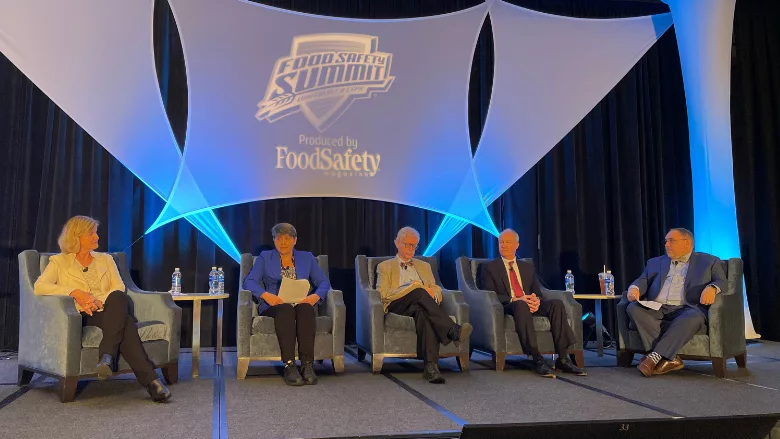FSS 2023: Q&A with Regulators and Advisory Groups

The 2023 Food Safety Summit Town Hall session, which took place on Thursday morning, centered on a conversation with top food industry regulators and advisory groups about the key issues, updates, and initiatives happening within their organizations.
The panelists included Donald A. Prater, D.V.M., Acting Director of the Office of Food Policy and Response (OFPR) at the U.S. Food and Drug Administration; Sandra Eskin, Deputy Under Secretary for Food Safety the U.S. Department of Agriculture (USDA); Steven Mandernach, Executive Director of the Association of Food and Drug Officials (AFDO), and Robert Tauxe, M.D., M.P.H., Director of the Division of Foodborne, Waterborne, and Environmental Diseases (DFWED), the National Center for Emerging and Zoonotic Infectious Diseases (NCEZID), and the office of the Deputy Director for Infectious Diseases (DDID) at the U.S. Centers for Disease Control and Prevention (CDC). The session was moderated by Gillian Kelleher, CEO of Kelleher Consultants LLC and Chair of the Food Safety Summit Educational Advisory Board.
Steven Ardagh of Eagle Protect, a sponsor of the Town Hall session, first took the stage to express the importance of ensuring that gloves used to handle food are safe and not contaminated. He then invited Ms. Kelleher to the stage to kick off the panel discussion.
Panelists
Mrs. Eskin was the first panelist to give her remarks. She highlighted USDA-FSIS’ food safety priorities and the work the agency is undertaking in these areas, namely, reducing illnesses associated with Salmonella contamination in poultry, determining the impact of line speeds in meat processing facilities on worker safety, and updating safe handling instruction labels.
Dr. Tauxe next shared how CDC partners with other federal, state, local, and territorial agencies, as well as with industry, to monitor and prevent foodborne illness outbreaks. He highlighted how PulseNet is helping achieve these goals and the center’s transition to metagenomics for tracking foodborne pathogens.
Following Dr. Tauxe, Dr. Prater stated, “It is a remarkable time to be working at FDA,” and provided insight to the agency’s new vision for a unified Human Foods program. He mentioned specific leadership changes happening at FDA, the agency’s reassessment of its core functions and practices, the expected release of a reorganization packet by autumn of 2023, and the ongoing search for a new Deputy Commissioner of Human Foods. He also mentioned FDA’s priorities for Fiscal Year 2023, specifically, infant and maternal health, chemical and toxicological concerns, and the New Era of Smarter Food Safety.
Finally, Mr. Mandernach gave his perspective on FDA’s present period of organizational change and called for understanding for staff members during a time of uncertainty. He then challenged the stakeholder community to take advantage of FDA’s program redesign and approach FDA with their input about what metrics matter most within their organizations. He also discussed retail food safety and AFDO’s work in that area, in particular, designing a course for industry in active managerial control, learnings from a wide analysis of inspection data and changes that must result from these learnings at the regulatory level, and the results of a survey of major retail brands and associations, which was included in the April/May 2023 issue of Food Safety Magazine. Finally, Mr. Mandernach teased that in 2024, AFDO will be focusing on small businesses.
Q&A
After their remarks, the audience was invited to participate in an extensive question-and-answer session with the panelists. Topics that were addressed included:
- The underreporting of foodborne illnesses, why it occurs, and, taking this issue into account, what may be done to better estimate the public health burden of foodborne illness
- The need to make food source attribution estimates as accurate as possible, and the complication of sporadic illnesses not associated with an outbreak
- The possible addition of Cronobacter sakazakii to the list of nationally notifiable diseases
- CDC’s hope to produce updated foodborne illness burden estimates within the year
- What a successful redesign of FDA’s Human Foods program might look like
- What the use of whole genome sequencing (WGS) at the state and local level looks like, as well as other data-driven tools that are available to the food safety community, and the need to improve environmental sampling at the retail level
- The differences in opinion among public health agencies on how valuable foodborne illness complaints shared by consumers on social media might be in identifying possible outbreaks
- How FDA and USDA’s joint work on regulating cell-cultured meats exemplifies effective inter-agency collaboration
- Considerations for developing regulations for controlled environment agriculture (CEA)
- FDA’s ongoing implementation of the Food Safety Modernization Act (FSMA) and how the agency intends to “educate and regulate”
- How FDA will use data for risk prioritization in order to prevent foodborne illness
- The perceived efficacy of the warning letter process, the existence of inspection authorities to stop production at the state level versus barriers that exist at the federal level
- Additional authorities that are needed for FSMA implementation, including data- and information-sharing authorities that FDA is striving to achieve through U.S. Congress, and the requirement for increased budget and resources.
The 2023 Food Safety Summit is taking place at the Donald E. Stephens Convention Center in Rosemont, Illinois from May 8–11. Select sessions, such as the town hall, are being broadcast live and can be viewed on demand for one year. Register to access!




